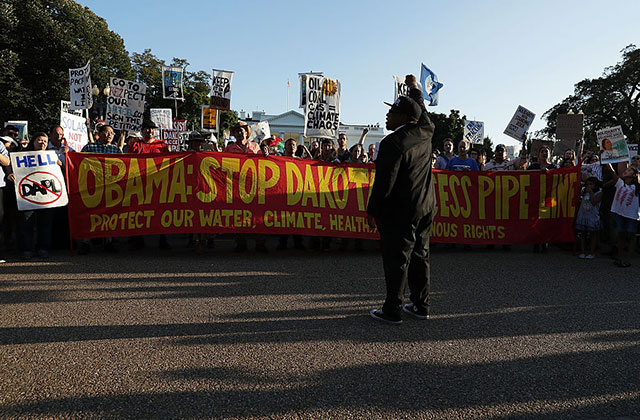Over the weekend, a number of events occurred in relation to the 1,172-mile-long Dakota Access Pipeline set to cross four states from North Dakota into Illinois. The controversial pipeline, nearly as long as the proposed Keystone XL Pipeline, would be able to carry as much as 570,000 barrels of crude oil per day.
The Standing Rock Sioux Tribe has been opposing the pipeline since April 2016, when they set up camp near construction sites. They argue that the pipeline puts their water, land and, ultimately, health at risk. Water protectors, a term the Sioux and their allies prefer to “protestors,” have been growing by the number as Indigenous people from across the world gather to join the tribe.
Here, key weekend developments on the pipeline.
Friday, September 16
The U.S. Court of Appeals for the District of Columbia Circuit ordered Dakota Access LLC, a subsidiary of Energy Transfer (the company behind the pipeline), to halt construction on potential ancient burial grounds 20 miles east or west of Lake Oahe. Building can resume if and when the U.S. Army Corps of Engineers decides whether to grant an easement there, according to E&E Publishing.
North Dakota U.S. District Court Judge Daniel L. Hovland dissolved a temporary restraining order Dakota Access LLC sought against Standing Rock Sioux Tribal Chairman Dave Archambault II, Councilman Dana Yellowfat and other water protectors. Now, local authorities must deal with tensions between the company and its opponents. Detention has been their main strategy. County police departments have arrested people who lock themselves to construction equipment, the most common form of resistance against the pipeline.
The U.S. Army Corps of Engineers issued a special use permit to the Standing Rock Sioux Tribe to use federal lands near Lake Oahe, which the Corps manages. The permit allows the tribe to continue its demonstrations on the territory legally.
Saturday, September 17
Iowa’s Lee County police arrested 43 people demonstrating against the Energy Transfer’s use of eminent domain to build the pipeline on private property, according to local news station KWQC. The Associated Press reports that more than 150 people took part in the action. “The use of eminent domain to take away people’s property not for the public good but for profit is really disturbing and it has to stop," protestor Benn Dunnington told KWQC. "This is a real travesty when it comes to the original concept of eminent domain.”
Saturday-Sunday, September 17-18
Rallies in Philadelphia, Washington D.C. and other cities across the country took on banks that fund the pipeline, including TD Bank and Chase. In Philadelphia, reports state that actions shut down five TD Banks.
‘Pipeline’ construction continues inside TD Bank branch. A few bewildered patrons. One asked for more info #NoDAPL pic.twitter.com/51Vzp1oUAR
— Dustin Slaughter (@DustinSlaughter) September 17, 2016
This is what solidarity looks like. Yesterday in Philly hundreds marched and 5 TD Banks were shut down. #NoDAPL pic.twitter.com/ntrhKjGvkL
— Sacred Stone Camp (@SacredStoneCamp) September 18, 2016
In Philly, protest at the doors of TD Bank, showing the $ pipeline that leads from there to the Dakotas #NoDAPL pic.twitter.com/pdxE1sPKcN
— Bill McKibben (@billmckibben) September 18, 2016
Phill thrive member Zalaka Thompson: "TD is funding dirty oil–we can’t drink oil, but water is life." #NoDAPL pic.twitter.com/4nFMGxdLg4
— Philly Thrive (@PhillyThrive) September 17, 2016
